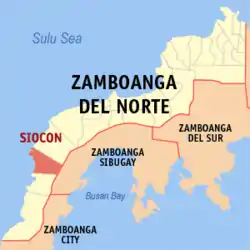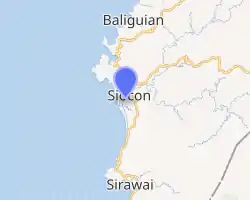Siocon
Siocon, officially the Municipality of Siocon (Cebuano: Lungsod sa Siocan; Subanen: Benwa Siocan; Chavacano: Municipalidad de Siocan; Tagalog: Bayan ng Siocan), is a 1st class municipality in the province of Zamboanga del Norte, Philippines. According to the 2015 census, it has a population of 46,907 people. [3]
Siocon | |
|---|---|
| Municipality of Siocon | |
 Map of Zamboanga del Norte with Siocon highlighted | |
OpenStreetMap 
| |
.svg.png.webp) Siocon Location within the Philippines | |
| Coordinates: 7°42′N 122°08′E | |
| Country | |
| Region | Zamboanga Peninsula (Region IX) |
| Province | Zamboanga del Norte |
| District | 3rd District |
| Founded | December 23, 1936 |
| Barangays | 26 (see Barangays) |
| Government | |
| • Type | Sangguniang Bayan |
| • Mayor | Julius S. Lobrigas |
| • Vice Mayor | Karon M. Esmali |
| • Representative | Isagani S. Amatong |
| • Electorate | 28,222 voters (2019) |
| Area | |
| • Total | 503.20 km2 (194.29 sq mi) |
| Elevation | 41 m (135 ft) |
| Population | |
| • Total | 46,907 |
| • Density | 93/km2 (240/sq mi) |
| • Households | 10,608 |
| Economy | |
| • Income class | 1st municipal income class |
| • Poverty incidence | 48.2% (2015)[4] |
| • Revenue | ₱155,550,758.46 (2016) |
| Time zone | UTC+8 (PST) |
| ZIP code | 7120 |
| PSGC | |
| IDD : area code | +63 (0)65 |
| Climate type | tropical climate |
| Native languages | Subanon Chavacano Tagalog |
| Website | siocon |
Visitors describe Siocon as a "hidden paradise".
Local industry includes the Canatuan mine.
Barangays
Siocon is politically subdivided into 26 barangays.
- Andres Micubo Jr. (Balili)
- Balagunan
- Bucana
- Bulacan
- Candiz
- Datu Sailela
- Dionisio Riconalla
- Jose P. Brillantes Sr. (Old Lituban)
- Latabon
- Makiang
- Malambuhangin
- Malipot
- Manaol
- Mateo Francisco
- Matiag
- New Lituban
- Pangian
- Pisawak
- Poblacion
- S. Cabral
- Santa Maria
- Siay
- Suhaile Arabi
- Tabayo
- Tagaytay
- Tibangao
Climate
| Climate data for Siocon, Zamboanga del Norte | |||||||||||||
|---|---|---|---|---|---|---|---|---|---|---|---|---|---|
| Month | Jan | Feb | Mar | Apr | May | Jun | Jul | Aug | Sep | Oct | Nov | Dec | Year |
| Average high °C (°F) | 30 (86) |
30 (86) |
31 (88) |
31 (88) |
30 (86) |
29 (84) |
29 (84) |
29 (84) |
29 (84) |
29 (84) |
30 (86) |
30 (86) |
30 (86) |
| Average low °C (°F) | 23 (73) |
23 (73) |
24 (75) |
25 (77) |
25 (77) |
25 (77) |
24 (75) |
24 (75) |
25 (77) |
25 (77) |
24 (75) |
24 (75) |
24 (76) |
| Average precipitation mm (inches) | 98 (3.9) |
78 (3.1) |
116 (4.6) |
115 (4.5) |
222 (8.7) |
281 (11.1) |
272 (10.7) |
282 (11.1) |
237 (9.3) |
258 (10.2) |
180 (7.1) |
108 (4.3) |
2,247 (88.6) |
| Average rainy days | 19.6 | 18.6 | 21.8 | 22.9 | 29.0 | 28.6 | 28.7 | 28.3 | 27.0 | 28.6 | 25.9 | 22.1 | 301.1 |
| Source: Meteoblue [5] | |||||||||||||
History
In 1955, the following barrios were created:[6]
- Lituban - from the sitios of Lituban, Pangian, Quibanbanan and Tabayo;
- Tibangao - from the sitios of Tibangao, Daanlawas, Mangcabing, Cuab and Matiag;
- Balagunan - from the sitios of Baliguian, Mamad and Balagunan Grande; and
- Malipot - from the sitios of Malipot, Siay, Kanibungan, Baligngan and Pisawac.
In May 2003, The municipality was attacked by 150 Moro Islamic Liberation Front (MILF) guerrillas and Abu Sayyaf.[7] The attacked commenced at 12 AM in MAY 4. Small group of policemen led by 27-year-old police senior inspector Ranie Planilla Hachuela defended Siocon that lasted nine hours. Hachuela managed to rally his men in putting up stiff resistance against the wave of attacks by the rebels trying to overrun the municipal hall, police station and hospital. For this reason he was awarded the Medal of Valor for risking his life and for rescuing the town mayor and his family.
The rebel created a bullet proof plan of securing the entry and exit of the Poblacion (town center). Responding government troops were ambushed as they tried to aid the policemen who were so unmanned at the moment.
That frightening feeling was expressed by wiljun cubero as he narrated how the rebels stormed the municipal hall and fire station right next to their house at Micubo's compound.
13 of the 150 rebels were killed including Jairullah Hassan aka Commander Hairon of the MILF who headed the attacked.
In the case of casualties, eleven government troops and 25 civilians lost their lives in the assault including two seminarians.[8] Public market was burned down and civilians were taken out from their home as a human shield as rebels withdraw. Some hostages were later released hours after while other strongmen were held for days as they were tasked to carry the rebel's wounded fellow in the thick forest in the municipality of Sibuco.
The day after the attached, MILF spokesman Eid Kabalu expressed that the attacked was a show of force by the MILF and Abu Sayyaf with in the area.
Demographics
| Year | Pop. | ±% p.a. |
|---|---|---|
| 1939 | 10,526 | — |
| 1948 | 11,751 | +1.23% |
| 1960 | 16,953 | +3.10% |
| 1970 | 18,842 | +1.06% |
| 1975 | 26,723 | +7.26% |
| 1980 | 29,519 | +2.01% |
| 1990 | 26,544 | −1.06% |
| 1995 | 28,196 | +1.14% |
| 2000 | 32,699 | +3.23% |
| 2007 | 41,221 | +3.25% |
| 2010 | 41,637 | +0.37% |
| 2015 | 46,907 | +2.30% |
| Source: Philippine Statistics Authority [3] [9] [10][11] | ||
Education
Most of its 26 barangays have their respective public elementary schools and only few have public secondary schools. In the town proper has its elementary and secondary public schools and a state university.[12]
Elementary
- Siocon CS
- Balagonon ES
- Bliss ES
- Bucana ES
- Bulacan ES
- Candiz ES
- Canibungan
- C. Callao ES
- D. Riconalla
- Lituban ES
- Malipot ES
- Ma. Ybarsabal
- Matiag ES
- Pisawak ES
- Siay ES
- Sta. Maria
- Tibangao ES
- Cuyan ES
- Latabon ES
- Mambong CS
Secondary
- Siocon NHS (to be converted into "Siocon Science High School")[13]
- Santa Maria Annex
- Siay Extension
- Holy Cross Academy – Foundation of Siocon
- Julian Soriano Memorial Comprehensive High School (formerly known as Siocon National Vocational School)
Tertiary
- Jose Rizal Memorial State University – Siocon
Notable people
- Jonathan "Lightning" Taconing (b. 1987) - Filipino boxer
References
- Municipality of Siocon | (DILG)
- "Province: Zamboanga del Norte". PSGC Interactive. Quezon City, Philippines: Philippine Statistics Authority. Retrieved 12 November 2016.
- Census of Population (2015). "Region IX (Zamboanga Peninsula)". Total Population by Province, City, Municipality and Barangay. PSA. Retrieved 20 June 2016.
- "PSA releases the 2015 Municipal and City Level Poverty Estimates". Quezon City, Philippines. Retrieved 12 October 2019.
- "Siocon: Average Temperatures and Rainfall". Meteoblue. Retrieved 30 April 2020.
- "An Act Converting into Barrios Certain Sitios in the Province of Zamboanga Del Norte". LawPH.com. Archived from the original on 2012-07-14. Retrieved 2011-04-11.
- http://www.philstar.com/headlines/209756/pnp-officer-who-defended-siocon-feted
- http://www.ucanews.com/story-archive/?post_name=/2003/05/05/seminarians-reported-killed-in-rebel-attack-in-the-south&post_id=22428
- Census of Population and Housing (2010). "Region IX (Zamboanga Peninsula)". Total Population by Province, City, Municipality and Barangay. NSO. Retrieved 29 June 2016.
- Censuses of Population (1903–2007). "Region IX (Zamboanga Peninsula)". Table 1. Population Enumerated in Various Censuses by Province/Highly Urbanized City: 1903 to 2007. NSO.
- "Province of Zamboanga del Norte". Municipality Population Data. Local Water Utilities Administration Research Division. Retrieved 17 December 2016.
- http://siocon.zamboangadelnorte.com/SioconSchools.htm
- Quismorio, Ellson (6 August 2020). "Siocon Science High School bill hurdles House panel". Manila Bulletin. Retrieved 19 October 2020.